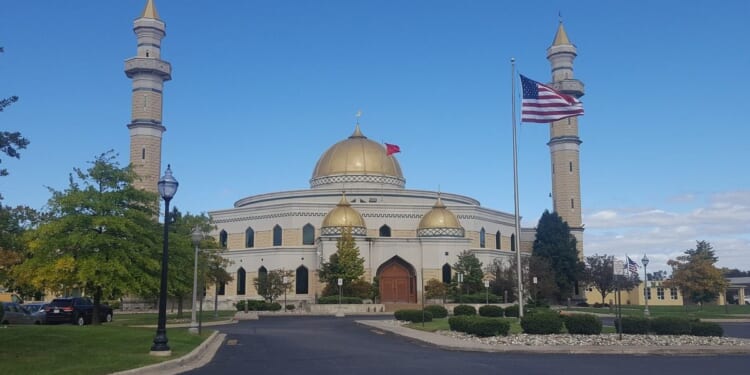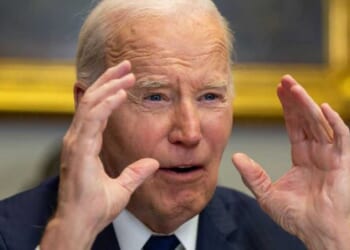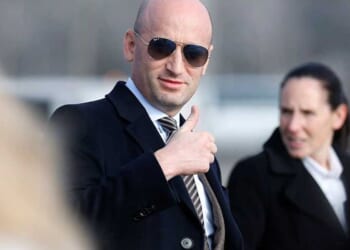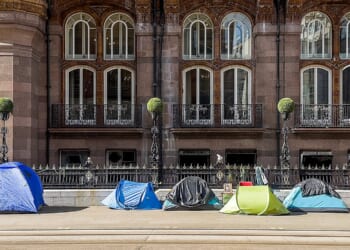Earlier this month, the U.S. Conference of Catholic Bishops (USCCB) published “Islamophobia: A Guide for U.S. Catholics on Anti-Muslim Bigotry.” Showcased on the USCCB website with a lovely Islamic design cover, this 15-page booklet exhorts Catholics to “address the disturbing phenomenon of anti-Muslim sentiment in our times.”
Introduced by the co-chairs of the National Catholic-Muslim Dialogue (NCMD) — Bishop Elias Lorenzo of Newark and Imam Kareem Irfan — the USCCB declares dire need to counter “the rising tide of anti-Muslim sentiment that has been present for decades.”
The guide uses the term “Islamophobia” as a blunt tool for erasing the Islam from Islamic terrorism. It runs interference for a bellicose religious culture that began its intended conquest of the world in the seventh century.
Discomfort with Islam Deemed a Moral Defect
The USCCB booklet appeared within days of the introduction of a bill by Sen. Ted Cruz to address the steady massacre of Christians in Nigeria by Islamic terrorists. Ongoing jihadist slaughter in DR Congo brought censure from Pope Leo in July after 49 Christians were hacked to death during a service. Some 64 Catholics were killed in Ntoyo, Congo, on Sept. 8-9. Christians are attacked and subjugated in more countries than any other religious group, according to The Washington Post.
But Catholics must not dwell on extremist episodes. Pope Paul VI’s 1965 advice to “hold Muslims in high esteem” prompts the USCCB to condemn “unfair stereotyping”:
Some of the most common and widespread stereotypes are that Muslims are uniquely prone to violence, oppressive to women, intolerant of other religious groups. . . . Most Muslims do not embrace such attitudes. . . . Just as we would not want others to define Catholicism and the Church by our worst moment in history or our present-day sins, we must avoid making generalizations about Muslims and engaging in collective blame. [emphasis original]
Written in the chiding tone of a guilt-inducing nanny, the guide ignores lethal realities that issue from Islamic theology and inform its worldview:
Stereotyping is a form of “bearing false witness against one’s neighbor.” We should be on guard against stereotyping and charitably correct one another when we hear anti-Muslim tropes or unfair generalizations about Muslims.
Catholics must examine their consciences for potential bias:
Reflect: Have I ever witnessed stereotypes about Muslims in my Catholic community, or in American life more broadly? What did it look like? . . . Reflect: What stereotypes about Muslims might I hold on to, despite my best intentions?
Recognition of Islam’s theological impulse to violence or its mission to bring the entire globe under Sharia is taboo. Islam’s quite different understanding of human rights and its inherent disdain for non-Muslims must not intrude on the pieties of interfaith harmony.
Steeped in suicidal empathy, the essay exhorts us to “to remind others of our own history of being scapegoated.” It ransacks the arsenal of buzzwords to muzzle questions about Islam: Islamophobia is a hate crime; a religious freedom issue; a form of racism. Muslims are persecuted. (“Imagine what it would be like to have your house of worship targeted by vandalism . . . .”)
Discomfort with Islam is deemed a moral defect. Retreating from historical lucidity, the USCCB places so-called Islamophobia on the same footing as antisemitism and anti-Judaism:
The Church’s ongoing commitment to improve Catholic-Muslim relations is a natural extension of its obligation to seek reconciliation with the Jewish people, their faith, traditions, and culture.
Fraternity demands public solidarity with Muslims. Catholics should engage in dialogue and build bridges: “Take a tour of your local mosque, attend or host an iftar (Ramadan fast-breaking meal).” Join a book club. Learn the iniquity of Islamophobia in such recommended tracts as Todd H. Green’s Presumed Guilty: Why We Shouldn’t Ask Muslims to Condemn Terrorism.
Why Is USCCB Trying to Silence Criticism?
Why is the USCCB anxious to silence criticism of Islam? Why is it defending an agent of its own civilizational decline? Retrace the funding trail of the document for a possible explanation.
Begin with the author Jordan Denari Duffner, a member of NCMD, itself a project of the USCCB. This booklet is a précis of her 2021 book Islamophobia: What Christians Should Know (and Do) About Anti-Muslim Discrimination.
In 2017, while studying for a Ph.D. in theological and religious studies at Georgetown University, she wrote Finding Jesus Among Muslims: How Loving Islam Makes Me a Better Catholic. The title promises an emotional, non-analytic approach. At the time, Georgetown was already on its way to becoming a nerve center for promoting left-wing ideology as Catholic tradition.
Once-Catholic Georgetown has been shilling for Islam for at least two decades. Cooperation began in earnest in 2005 with the gift of a $20 million endowment fund from Saudi billionaire Prince Alwaleed bin Talal. It was given to expand the existing Center for Muslim-Christian Understanding at Georgetown’s prestigious Edmund A. Walsh School of Foreign Service. In recognition of the tycoon’s support, director John Esposito renamed the center the Prince Alwaleed bin Talal Center for Muslim-Christian Understanding (ACMCU).
Grants and contracts from Qatar, worth more than $927.6 million, flowed to ACMCU between 2005 and 2023. Much of that funding is reported to have been routed through the Qatar Foundation. The foundation is a tentacle of the Qatari regime, according to the Institute for the Study of Global Antisemitism and Policy. The foundation has ties to the Safa Network, a nexus of charities that work to propagate Islamist ideology, as reported by the Middle East Forum. In 2005, Georgetown opened a satellite campus in Qatar supported by partnership with the Qatar Foundation.
Labyrinthine connections between Georgetown and Qatar are recorded in detail in “Beachhead: Georgetown U,” an exhaustive study of Islamist influence from Middle East Forum. It appeared this past July with little notice from mainstream media.
One wonders if foreign “charity” has found its way to the many interlocking affiliates of the USCCB, i.e., Catholic Charities (CC), the Catholic Campaign for Human Development (CCHD), et alia. Trump administration curtailment of illegal migration plus deportation of illegal aliens affects the income of hundreds of CC/USCCB chapters. So-called refugee resettlement is a major source of federal income for dioceses around the country.
What needs no guesswork is that this USCCB apologia gilds the candidacy of Muslim mayoral contender Zohran Mamdani. The bishops as a body, and New York’s Cardinal Timothy Dolan in particular, are open borders zealots. They have an interest in the election of Mamdani, who vows to uphold sanctuary city status, strengthen laws that hedge cooperation with federal immigration enforcement, and increase funding for legal assistance to illegal aliens.
Cardinal Dolan has scheduled a Nov. 5 event at the Sheen Center to promote “interreligious collaboration.” A panel discussion — with melodic interludes by a cantor from the sympathetic Park Avenue Synagogue and Sufi musicians — will occur the evening after Election Day. As things look, it is likely to be a celebration of New York’s first Muslim mayor.
The road to dhimmitude is paved with the unacknowledged intentions of interfaith dialogue.
















